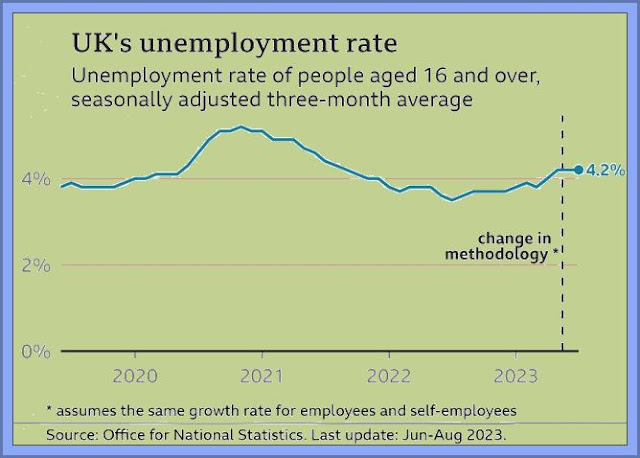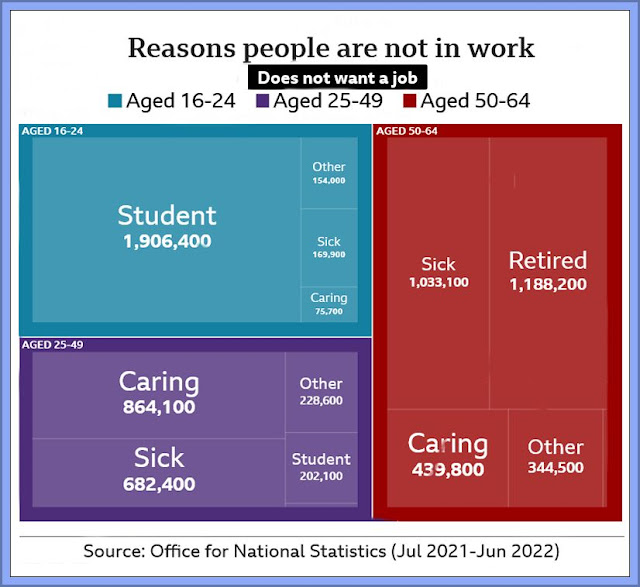The biggest problem with a welfare benefit based society ....
 |
| Not In Work Age 16 - 64, Reasons June 2022 |
.... is the growth of a welfare benefit dependency.
That is the slow, but gradual build up of a cradle to grave group of citizens, who never work, depend upon welfare payments, and quite frankly some also turn to crimes such as shoplifting, small scale drug dealing, benefit frauds (such as casual working without declaring the income), or burglary, etc, to top up their welfare payments.
 |
| UK Unemployment Rate August 2023 |
The UK has been on this road for longer than almost any other nation, and so has built up a comparatively large number of citizens who do nothing, or are happy to accept doing nothing, but live off the taxes raised by the work of the rest of society .... if anyone doubted that this statement is true, then the the fact that in June 2023, it was reported by the Office of National Government Statistics that 1 in 7 homes with working age adults in the UK, has no one working.
That means there are nearly 2.5 million homes with at least one person aged between 16 and 64 in it, where no one works. That's 13.7% of that household type. For comparison, nearly 6 in 10 homes are comprised of all working adults, and the rest are a mix of employed and unemployed adults. Another odd fact is that since 2020, nearly 400,000 people have quit full-time work and are now claiming long term sickness benefits (thus disappearing from the official unemployment figures, which are lower than they should be) .... again a figure that is hard to understand, unless its because the welfare system offers an acceptable alternative to working. By May 2022 job vacancies reached 1.3 million .... so why are they unfulfilled?
Of course each successive government has said that we must tighten the rules on the issuing of sick notes, especially long-term sick notes for medical conditions such as bad back, chronic fatigue, etc and forcing welfare recipients who are capable of work to show that they are actively seeking and willing to accept work if its offered.
In fact that's why Universal Credit was introduced, to replace the old style assessment systems of Unemployment and Sickness / Disability / Mobility benefits etc, because it allows assessment of what work any claimants can perform. And yet, the issue of welfare dependency continues to get worse ....
 |
| Economically Inactive June 2022 - Those Who Don't Want A Job |
There are a number of contributing factors:
- Almost nobody in the over-50s range who has taken early retirement, returns to work.
- 1.1 million people in the 25- to 49-year-olds don't do any work because of caring responsibilities (about a million of these are women) .... as this caring takes the place of state help to do the same thing there is some scope for paying them to care rather than treat them as economically inactive.
- About 940,000 people the 25- to 49-year age group, are not working because of illness (more evenly split between men and women). This group could possibly be made more economically active with support.
- Around half of people with disabilities don't have a paid job, a rate that's more than double the rest of the working age population. But about a quarter of those who are sick or caring say they want a job.
Now when you consider that Britain not only has a shortage of skilled labour (the decline in the standards at comprehensive schools is at least partly at blame for this as we don't meet employers needs), but also for unskilled workers such as seasonal crop pickers, hotel and catering etc, then the fact that nearly 5 million people are registered as 'unemployed' is an alarming statistic. If nothing else, it indicates a disconnect between what employers need to fill vacancies and what the education system is churning out instead.
The fact is, that unless it becomes a national target by the two main political parties to cut welfare dependency, then it will never be tackled .... for instance two areas that would need joint reform are:
The Education System:
This needs to be geared more towards employment prospects:
1. Acceptance that only about a third of pupils are really suitable for university or higher level education.
2. University courses need to be more work orientated - so more Science (Maths, Physics and Chemistry etc), I.T., Engineering etc and less on courses that may end up with the holders stacking shelves e.g art history or sociology .... that doesn't mean there is no place for the arts and social sciences, but that the balance of places on offer at Universities, should favour those areas where we have national employment recruitment issues.
3. This means that schooling from age 16 to 18, should offer more vocational courses to those who are not university bound, and or just want skills that they would benefit from, e.g. apprenticeships (including out of school placements), such as car mechanics, painting and decorating, plumbing, electricians, builders (brick laying, plastering, roofers, scaffolding etc). In short, work transferable skills that would give good employment and wage opportunities, and ease the shortages in the workforce.
The Benefit System:
This needs to be more strict with able bodied claimants:
1. Work-fare style - Refusal to accept an offer of a job, even seasonal work (with government top up payments if wages not up to benefit levels, plus transport cost assistance), should result in significant benefit cuts.
2. Real work programs should be set up, for those who need to be taught work discipline e.g. getting up, travelling to somewhere, 9 to 5, and 5 days a week etc .... with again, financial penalties for not sticking to it. This sort of idea has been implemented in the US states under the Personal Responsibility and Work Opportunity Reconciliation Act, and the left could hardly complain, as it was their darling, President Bill Clinton's legislation.
I can't recall which states, but some of the North Eastern US states require single parents to attend state run work programs, in return for child care and welfare payments, if they can't find private sector work (they also had the lowest single parent rates in the US - so a win win situation).
If run together, something like these ideas/reforms (and I don't say these are the best ideas but are just illustrative) would:
- Reduce the number of school drop-outs/leavers and university graduates who are unemployable.
- Break the idea that the welfare benefit system is an acceptable lifestyle for the fit and able, instead of working.
But lets be honest, these types of linked reforms are never going to happen, not unless public opinion was so angry at the rising numbers of 'unemployed or long-term sick,' that electoral success was dependent upon major reform being undertaken.
Update 15/03/2024:
More than one in five working-age adults in the UK are still not actively looking for work, according to figures released this week. The latest figures released by the Office for National Statistics (ONS), show that the UK’s economic inactivity rate was 21.8 per cent between November and January, with nearly 9.2 million Britons aged between 16 and 64 are unemployed and are not looking for a job. The total figure is more than 700,000 higher than before the coronavirus pandemic, and marginally higher than a year earlier.
As might be expected, immigration, religion and ethnicity plays some part in this, with some groups markedly higher than others .... for instance the Pakistani / Bangladesh group have 33% economic inactivity, as females are less likely to ever go to work (Muslim women are often not allowed out without a male relatives permission or accompaniment in the most 'conservative' religious families).
Overall this figure has been persistently high since the pandemic, with an increase in long-term sickness cited as being one of the major reasons behind the rise, with about a third of the working-age inactive population claiming this reason.
The increase in 'sickness' claims is most marked in generations 'snowflake,' with an increase in people aged 16 to 34 becoming economically inactive. A report by the Resolution Foundation said young people now have the poorest mental health of any age group. Two decades ago they had the lowest incidence of common mental disorders.
Interestingly, Greenarc Ltd chief executive Chris Bingham told the BBC that he wanted the governments to focus on “apprenticeships and workplace engagement as opposed to a blanket university route” (see my point 1 in Education System above). While Alexandra Hall-Chen, principal policy adviser for employment at the Institute of Directors,also told the BBC that governments should address skills shortages and focus on increasing labour force participation (points 2 and 3 in Education System above).
The long waiting lists at the NHS are also considered a contributing factor, as many people have apparently chosen not to work, while awaiting medical treatment or waiting for dependents being treated, as they need to provide care to their sick family members.
But frankly, in many cases its the ease with which welfare benefits can be accessed by the 'cradle to the grave' generation, which fuels a lot of his economic inactivity in the 16 to 34 year olds ... they just don't fancy going to work, when they can get by on the benefits system. This is perhaps the logical outcome of four or five generations (or more), of families who have never (or rarely) worked outside of the black economy, since the welfare state was formed in 1948.
However, apparently we in the UK have a lower economic inactivity rate amongst the 16 to 64 year olds than the US (25.2%), France (26.1%) and Italy (33.3%), or so it was claimed from OECD figures. For those who are interested, here are the latest OECD figure for a dozen selected countries (in no particular order) for comparison:
| No | Country | Percentage |
|---|---|---|
| 1 |
France |
26.1 |
| 2 |
Canada |
20.0 |
| 3 |
Australia |
19.3 |
| 4 |
Germany |
20.2 |
| 5 |
Italy |
33.3 |
| 6 |
Japan |
18.6 |
| 7 |
Sweden |
15.9 |
| 8 |
United States |
25.2 |
| 9 |
Türkiye |
40.5 |
| 10 |
Spain |
25.2 |
| 11 |
New Zealand |
16.8 |
| 12 |
Ireland |
22.6 |

No comments:
Post a Comment
All comments are welcomed, or even just thanks if you enjoyed the post. But please make any comment relevant to the post it appears under. Off topic comments will be blocked or removed.
Moderation is on for older posts to stop spamming and comments that are off topic or inappropriate from being posted .... comments are reviewed within 48 hours. I don't block normal comments that are on topic and not inappropriate. Vexatious comments that may cause upset to other commentators, or that are attempting to espouse a particular wider political view, are reviewed before acceptance. But a certain amount of debate around a post topic is accepted, as long as it remains generally on topic and is not an attempt to become sounding board for some other cause.
Final decision on all comments is held by the blog author and is final.
Comments are always monitored for bad or abusive language, and or illegal statements i.e. overtly racist or sexist content. Spam is not tolerated and is removed.
Commentaires ne sont surveillés que pour le mauvais ou abusif langue ou déclarations illégales ie contenu ouvertement raciste ou sexiste. Spam ne est pas toléré et est éliminé.